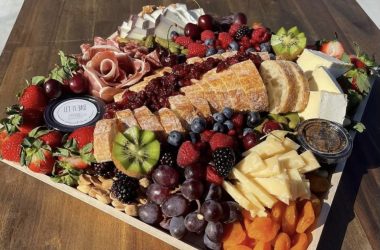Welcome to the culture corner, a recurring series focused on the homesickness, culture collision and assimilation that California State University, Long Beach’s international students experience. It’s a chance to learn about another culture and see your own through a different pair of eyes.
Meet Ngozi Kalu, a matriculated student on an F1 visa from Lagos, Nigeria. She’s two years into a nursing degree at the Beach.
Why did you decide to study abroad in the United States and why CSULB specifically?
I had family in the United States so I decided to see what I could achieve studying here. I applied to three CSUs—Fullerton, Dominguez Hills and Long Beach—and my uncle who went to CSULB recommended it. I got my admission letter for CSULB first, so everything was just pointing toward it.
What family do you have here?
I have grandparents, uncles, aunts and cousins. But my dad, mom, brothers and sisters are back in Nigeria.
To you, what is the biggest difference between life in Nigeria and the United States?
In Nigeria we have good public transportation. I think it’s better than we have here when it comes to availability. There’s no schedule to see when the bus is coming. You can leave your house whenever you want and the bus is always there for you. They’re lined up so when one gets filled up, the next one is waiting. The downside is that if there’s not a lot of people getting onto the bus you are just waiting.
What’s one place you really want to go in the United States?
I’ve heard of Chicago because my ex-roommate went there. She went during fall and they had snow. That’s one thing I was pissed about when I got here because I heard it never snowed in [Long Beach]. I’ve never been in the snow.
How diverse is Nigeria?
Nigeria is the most populous country in West Africa; there’s over [173] million people. We have a lot of ethnic groups and about 800 local governments that have their own indigenous languages and customs. I belong of the igbo ethnic group.
Tell me about the food in Nigeria.
It’s many different cultures and ethnic groups coming together and making delicacies. We eat a lot of starch like casaba flour and yam flour. We also eat a lot of soups. We have vegetable soups, okra soups.
What’s your favorite Nigerian dish?
My favorite is afang soup. Afang soup is a thick vegetable soup with waterleaf and periwinkle.
What’s your favorite American food?
I never tried burgers before I got here. The first burger I had was McDonalds. I’d seen a lot about McDonalds on TV. That was my number one place to go after coming here. I don’t think we have it in Nigeria.
Is there a lot of Western influence in Nigeria?
Of course, Western influence has been there since day one. We were colonized by Britain.
What don’t you miss about Nigeria?
Nigeria needs to work on its infrastructure, especially electricity. Anytime the electricity goes out here, I don’t get surprised. I say, “I’m used to this.” In Nigeria the electricity goes out randomly all the time. We don’t have constant light. In the good neighborhoods there’s better electricity, but in the bad neighborhoods the electricity posts are not stable enough and they fall sometimes and people get electrocuted. It’s really something to appreciate here; to have light 24/7.
What do you miss the most about Nigeria?
Oh I miss their craziness. I don’t mean it in a bad way. When you hear two Nigerians interact—Nigerians born there—they talk so fast and they are so into the conversation. I miss the slangs we use like Pidgin. It’s broken English with a lot of slang.
Has going to school in the United States helped you adjust better?
School helped me a lot. All the experiences—the good, the bad and the ugly—they all helped. I don’t think you can develop as a person if you don’t meet people. A man cannot be an island.
What do plan to do when you graduate?
A: Permanently relocate here and work. My plan is to become a nurse practitioner.



